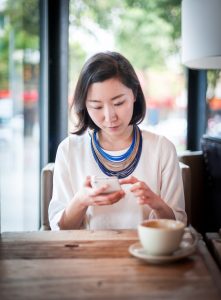For many lockdown increased isolation and loneliness, especially for the elderly in our communities. That’s why many charities such as Age UK launched and expanded befriending telephone services to help reduce isolation and connect people as many were told to stay in their homes. In this blog, Lisa (MSc in Anthropology and Development, 2020) explores her experience volunteering with Age UK Kensington & Chelsea during lockdown and shares her valuable insight into the lives of the elderly in our community.
Have you ever phoned someone you never met every week for six months?
That’s what I have been doing at Age UK Kensington & Chelsea (K&C) since the lockdown. And it’s not just one person that I call, it’s five.
Shortly before I came to LSE for my master degree, my grandma – the only living grandparent I had at that time – passed away at age 87. The strong desire of being closer to seniors brought me to Age UK K&C who showed up at LSE’s volunteer fair in October last year.
However, I didn’t have my induction until late January this year because of the overwhelming study load I had and the DBS check which took a long time. Just at the time I was about to kick-start as a befriending volunteer, the lockdown came, turning everything upside down. I thought I might have to sadly say goodbye to my plan that has yet to begin; I didn’t know then that it was the beginning of an even better journey, of course, from a volunteering point of view.
The initiative that I joined is called Check-In & Chat, a new program that Age UK started for people over 70s who live alone to help them cope with challenges arising from the pandemic. As the name of the initiative indicates, each week I give a call to five Age UK members to check how they are doing, whether they need any help, such as food delivery or medication pick-up. Most of the time, however, we were just chatting about everything, ranging from their life stories to the flowers they grew in the garden.
Most of the time, however, we were just chatting about everything, ranging from their life stories to the flowers they grew in the garden.
The conversation I had with them opened a window, allowing me to see how life might look like when I grow older. Like some of them, I might not give birth in my life and have to rely on relatives for help from time to time. My favourite coffee shop is just at the corner, but this five-minute walk might seem like Mount Everest that I could never reach the top.
Without the lockdown, I would not be able to know the details of the lives of these people. Now, every Friday morning for a few hours, I have the chance to travel with them in their times, feeling their anxieties, loneliness, sorrow, and sometimes joy. They shared with me useful life skills, for example, never buy corns that do not have leaves; they helped me refresh my German, and taught me how to pronounce ‘loch’ when knowing I was going to Scotland over the summer.
The seniors I call are also a miniature of the diversity of the city – only one of them is British, with the rest from Sri Lanka, France, Nigeria, and Germany, although they have been in London for years. As a student of anthropology, I’m interested in human beings and culture. The life journeys they shared certainly enriched my study in a different way.
I once asked the coordinator of this initiative, how should I respond to the mental and psychological issues of these people if I’m not trained professionally? The answer I got was, just listen. In this day and age, many of us are living in autopilot mode trying to solve problems. However, some problems, like the ones with those elders, are not meant to be fixed, but heard.
This is the best lesson I got out of the pandemic – learn to listen.
If Lisa has inspired you to volunteer, check out one of our other ongoing opportunities or book a one-to-one with David Coles, the Volunteer Centre Manager if you have more questions. And why not follow us on Facebook, Twitter, and Instagram to stay up-to-date with our events and opportunities and read our blog for more volunteering tips and stories.




